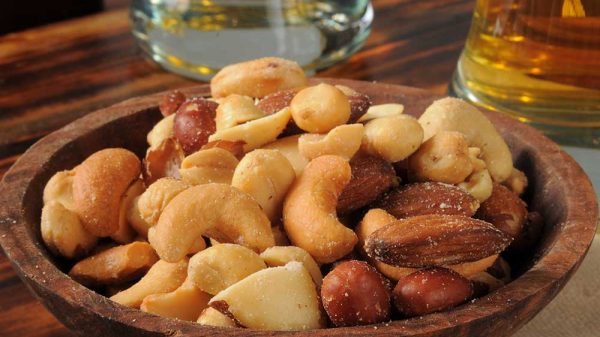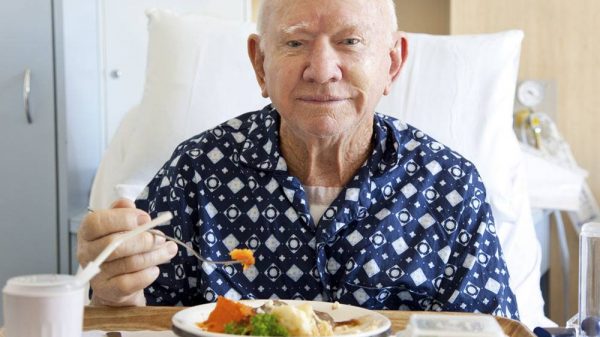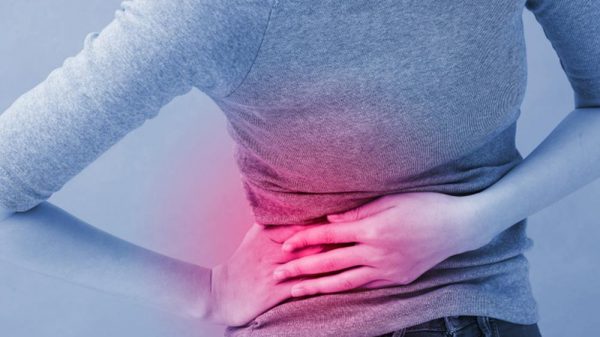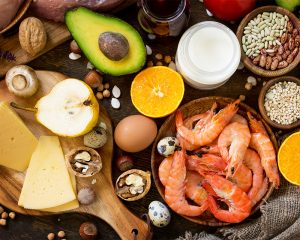If you have fatty liver disease, you may be searching for ways to support your liver health and manage the condition. What are the most effective liver support supplements and what should you be eating for fatty liver disease? Here we discuss the best supplements for liver health and the diet and lifestyle tips that support a healthy liver.
What Is Fatty Liver Disease?
Before we discuss the best supplements for liver support and fatty liver disease, let’s talk about what it means to have fatty liver disease. Fatty liver disease, or hepatic steatosis, is a common condition that affects millions of Americans and is characterized by the accumulation of fat within liver cells. When left untreated over time, fatty liver disease may progress to serious liver diseases like nonalcoholic steatohepatitis (NASH), liver fibrosis, and liver cirrhosis.
Usually, fatty liver disease is associated with either metabolic syndrome or excessive alcohol consumption. Nonalcoholic fatty liver disease (NAFLD) is linked to metabolic dysfunction, while alcoholic fatty liver disease is linked to chronic alcohol use.
In the early stages, fatty liver disease may not have any symptoms. However, as the condition progresses to more serious liver diseases, you may experience symptoms like fatigue, nausea, pain in the abdomen, jaundice, muscle wasting, and swelling.
Luckily, fatty liver disease is highly responsive to dietary and lifestyle interventions. Diet changes, lifestyle changes, and certain dietary supplements play a role in preventing the progression of fatty liver disease and actually reversing the condition. The liver is a resilient organ that can repair and heal with the right support. Even liver regeneration is possible when a portion of the liver is removed!
Essential Amino Acids and N-Acetylcysteine for Fatty Liver Disease
Essential amino acids and N-acetylcysteine are two key liver support supplements that may play a crucial role in fighting against fatty liver disease.
Why Should You Take Essential Amino Acids for Fatty Liver Disease?
First, let’s dive into what essential amino acids are. Essential amino acids are nutritionally indispensable components of protein that the body requires to carry out nearly all biological processes, including the synthesis of muscle tissue, connective tissue, neurotransmitters, hormones, and enzymes. Getting essential amino acids is vital for supporting the immune system and encouraging fast recovery times from illness, surgery or injury, and workouts.
Taking a nutritional supplement that offers optimal ratios of essential amino acids may have therapeutic impacts on fatty liver disease. Research published in Nutrition, researchers investigated the impact of essential amino acid supplementation on 12 elderly individuals with impaired glucose tolerance. (1) Results revealed that in comparison to the control trial, the experimental trial group saw decreases in liver fat levels, cholesterol levels, and plasma triglycerides. (1)
Essential amino acids may play a role not only in reversing fatty liver disease but also in fighting other serious liver conditions. Research published in the Journal of Cancer Prevention explores how amino acids may have a potential therapeutic effect on liver diseases. (2) For example, essential amino acids such as histidine and leucine reduce inflammation and fat accumulation in liver tissue. (2)
Other research published in Translational Gastroenterology and Hepatology examines how branched-chain amino acids (which include the essential amino acids leucine, isoleucine, and valine) may suppress the development of hepatocellular carcinoma. The branched-chain amino acids also have benefits for liver cirrhosis. Liver conditions like fatty liver disease, liver cirrhosis, and chronic viral hepatitis like hepatitis B and hepatitis C increase the risk of developing liver cancer. (2, 3)
Why Should You Take N-acetylcysteine for Fatty Liver Disease?
Science demonstrates the important role that N-acetylcysteine (NAC) plays in supporting liver health and potentially reversing fatty liver disease. NAC is a derivative of the amino acid cysteine and supports antioxidant activity in the body. The compound is linked to better mitochondrial function and may even support anti-aging. Plus, taking a high-quality supplement with NAC may support liver health.
Research demonstrates that NAC may have beneficial effects for individuals with nonalcoholic fatty liver disease. In a study published in Hepatitis Monthly, researchers found that NAC supplementation was connected to lower levels of liver enzymes including alanine aminotransferase. (4) Individuals experiencing liver inflammation associated with fatty liver disease often have elevated liver enzymes.
NAC is also used as an antidote to treat acetaminophen overdose. Acetaminophen is a compound found in over-the-counter medications like Tylenol to manage fevers and pain. When taken as directed, acetaminophen helps manage cold and flu symptoms.
However, acetaminophen overdose can cause liver injury. Research published in the New England Journal of Medicine describes how taking N-acetylcysteine increases the amount of the antioxidant glutathione in liver tissue. (5) Higher levels of glutathione increase oxygenation in liver tissue, which facilitates liver recovery. (5) An article published in the Yale Journal of Biology and Medicine explains why glutathione is so important for liver health. (6) Glutathione is vital in detoxification mechanisms that are carried out in liver cells. (6)
What Should You Eat If You Have Fatty Liver Disease?
In addition to taking a balanced essential amino acid supplement with NAC, a liver-friendly diet can help fight against fatty liver disease and restore healthy liver function.
- Fruits and vegetables: Fruits and vegetables offer numerous health benefits. Enjoy fruits and veggies in abundance to support liver health. Fruits and veggies offer micronutrients like vitamin C, vitamin E, and other antioxidants that facilitate liver repair and fight against oxidative damage.
- Spices and herbs: Adding more flavor to your food has the added benefit of supporting liver health. Help reduce inflammation in your liver by adding spices like turmeric, garlic, and oregano to your dishes.
- Omega-3 fatty acids: Omega-3 fatty acids are known for their potent anti-inflammatory effects. Get omega-3 fatty acids from foods like salmon, mackerel, pecans, walnuts, flaxseeds, and chia seeds.
- Foods containing choline: Choline is a vital nutrient present in certain foods that supports healthy liver function and cholesterol levels. You can obtain choline from dietary sources like chicken, fish, eggs, tofu, quinoa, mushrooms, and peanuts.
- Fiber and probiotic-rich foods: A healthy gut supports a healthy liver. Make sure you get plenty of dietary fiber and probiotics to supports a balanced gut microbiome. Better gut health means that the liver enjoys anti-inflammatory benefits. Reach for foods like whole grains, nonfat yogurt, kimchi, and kefir.
- Tea and coffee: Certain beverages like green tea and coffee have been regarded as liver detox or liver cleanse elixirs to help repair liver damage and fight against conditions like fatty liver disease. Dandelion root tea, silymarin in milk thistle tea, and artichoke leaf tea may help fatty liver disease by reducing inflammation.
What Not to Eat If You Have Fatty Liver Disease
Just as there are foods that you should be eating if you have fatty liver disease, there are also foods that should be avoided if you have fatty liver disease.
- Saturated fat: Saturated fat is found in fatty meat and dairy products and is linked to higher cholesterol levels, higher blood triglycerides, and an increased risk of heart disease. Always choose low-fat and nonfat options when consuming meat and dairy.
- Added sugar: A diet high in added sugar increases the risk of developing conditions like type 2 diabetes, insulin resistance, and fatty liver disease. Steer clear of foods high in added sugar, such as soda, ice cream, candy, pastries, and sugary breakfast cereal.
- Refined grains: Much like added sugar, refined grains spike blood sugar levels and increase the risk of developing insulin resistance, type 2 diabetes, and fatty liver disease.
- Alcohol: The liver is responsible for the detoxification process of ethanol when we drink alcoholic beverages. Drinking too much alcohol induces oxidative stress, which causes free radicals to accumulate and cause liver damage. Eliminating alcohol allows your liver time to detoxify and heal.
Things to Keep in Mind
It’s also a good idea to check with your physician or healthcare provider before starting new herbal supplements and making drastic diet or lifestyle changes. It also may be a good idea to check for underlying medical conditions, since fatty liver disease and liver inflammation can sometimes arise as a result of conditions like chronic hepatitis, autoimmune hepatitis, Gaucher disease, or chronic viral infection with hepatitis B or hepatitis C.
The Most Effective Liver Support Supplements and Foods for Fatty Liver Disease
If you’re looking for a detox liver process or liver flush, certain supplements can help your liver repair and heal. Essential amino acids and N-acetylcysteine may be vital pieces of the puzzle when it comes to supporting liver health. If you have fatty liver disease, consider adding high-quality essential amino acids and NAC supplements to your regimen. Getting plenty of antioxidants, supporting gut health, and eliminating alcohol also help fight against fatty liver disease.
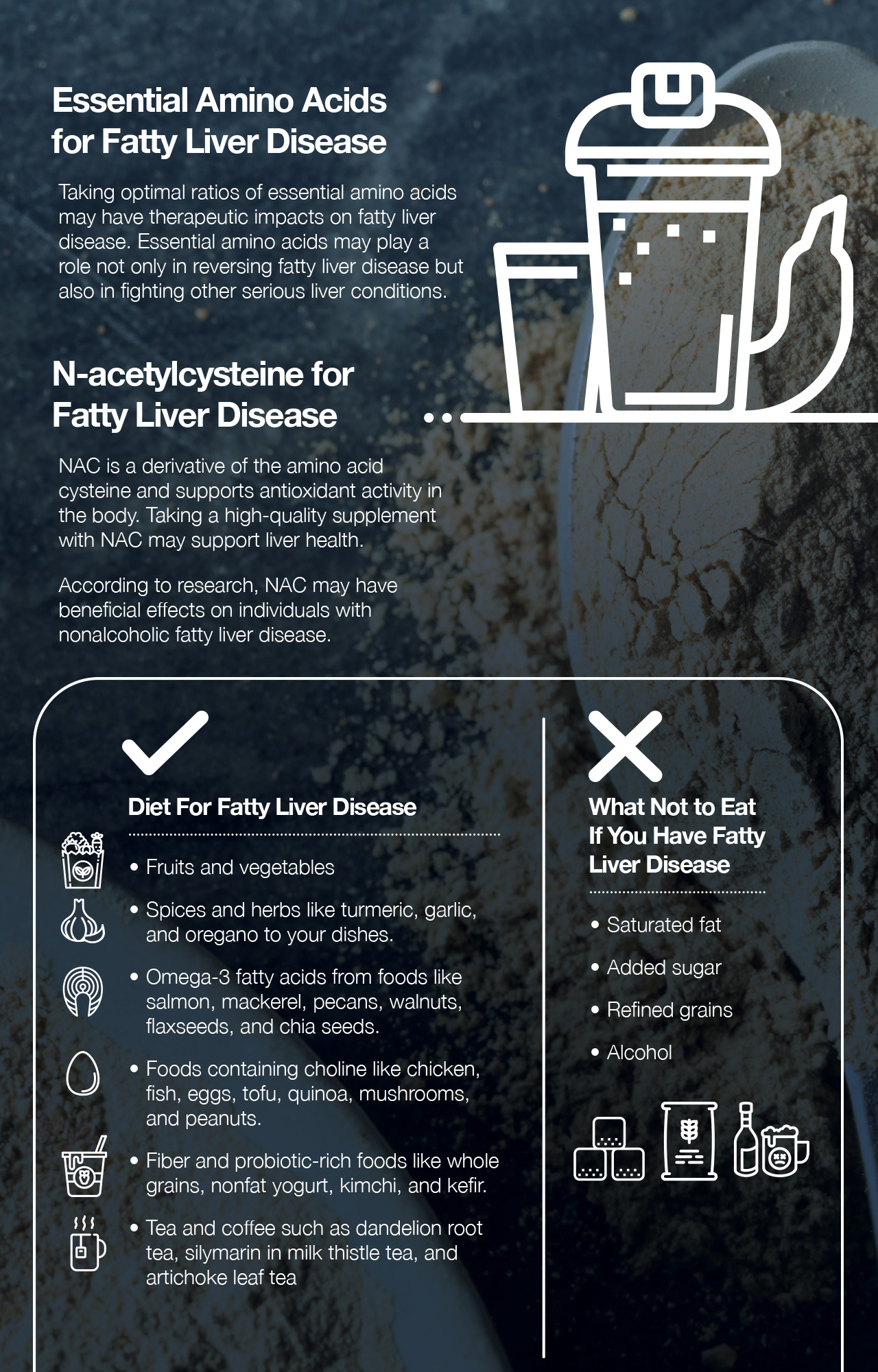
References:
(1) https://www.ncbi.nlm.nih.gov/pmc/articles/PMC2696073/
(2) https://www.ncbi.nlm.nih.gov/pmc/articles/PMC6619856/
(3) https://www.ncbi.nlm.nih.gov/pmc/articles/PMC6088198/
(4) https://www.ncbi.nlm.nih.gov/pmc/articles/PMC3270338/
